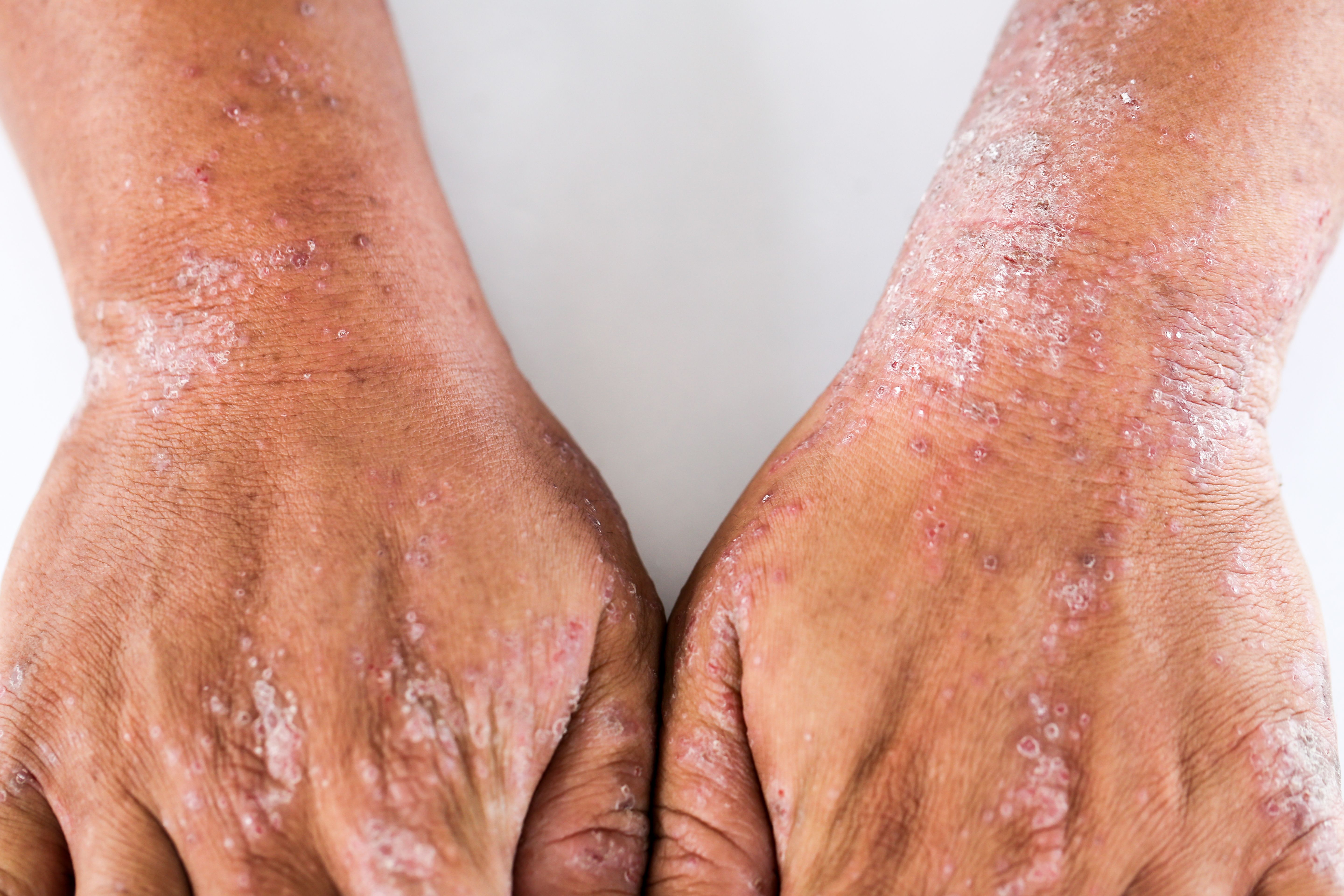Arcutis Biotherapeutics Seeks FDA Approval for Roflumilast in Atopic Dermatitis
In clinical trials, roflumilast cream demonstrated rapid and sustained improvement in the signs and symptoms of atopic dermatitis in patients 6 years of age and older.
The FDA has accepted a supplemental new drug application (sNDA) from Arcutis Biotherapeutics, Inc. for roflumilast cream 0.15% to treat atopic dermatitis in patients 6 years of age and older. The sNDA for the once-daily, steroid-free, next-generation phosphodiesterase-4 (PDE4) inhibitor was assigned a Prescription Drug User Fee Act (PDUFA) target action date of July 07, 2024.
Image credit: sinhyu | stock.adobe.com

daily, steroid-free roflumilast cream has the potential to become the new standard of care in atopic dermatitis,” Frank Watanabe, Arcutis president and chief executive officer, said in a press release.1 “We look forward to working closely with the FDA during the review process as part of our ongoing efforts to develop topical roflumilast for the treatment of immune-mediated skin diseases.”
Atopic dermatitis is a chronic disease that leads to inflammation, redness, and irritated skin that can become extremely itchy. The disease typically begins in childhood but can develop at any age. In patients with atopic dermatitis, scratching the skin can exacerbate the condition, increasing redness, swelling, cracking, leaking of clear fluid, crusting, and scaling. Flare-ups of atopic dermatitis can be followed by periods in which the skin improves or clears up entirely.2
“Atopic dermatitis is a chronic and recurring inflammatory skin condition that requires therapy that is effective, tolerable, and suitable for long-term use by both adults and children. Due to its waxing and waning nature, long-term disease control is ideal for the patient versus cyclical treatment, which consists of starting and stopping treatment when skin is controlled and when it is not,” study investigator Lawrence Eichenfield MD, chief of pediatric and adolescent dermatology at Rady Children’s Hospital-San Diego, professor of dermatology and pediatrics and vice-chair of the Department of Dermatology at UC San Diego School of Medicine, said in a press release.1
Arcutis Biotherapeutics’ application was supported by significant findings from a trio of Phase 3 trials, a Phase 2 dose ranging trial, and a pair of Phase 1 pharmacokinetic studies. In the phase 3, parallel group, double blind, vehicle-controlled INTEGUMENT-1 and INTEGUMENT-2 (The INterventional Trial EvaluatinG roflUMilast cream for the treatmENt of aTopic dermatitis) trials, investigators assessed the safety and efficacy of roflumilast cream 0.15% in AD.
The cream achieved the primary endpoint of the trial with a validated Investigator Global Assessment—Atopic Dermatitis (vIGA-AD) Success rate of 32.0% vs. a vehicle rate of 15.2% (P<0.0001), and 28.9% vs. a vehicle rate of 12.0% (P<0.0001) at week 4, in INTEGUMENT-1 and -2, respectively.
More than 30% of patients administered roflumilast in each trial achieved Worst Itch-Numeric Rating Scale (WI-NRS) Success at week 4, showing quick and significant improvements in the symptoms of atopic dermatitis as early as 24 hours after the cream was initially applied.
Further, over 40% of patients administered roflumilast cream achieved a 75% decrease in Eczema Area and Severity Index (EASI-75) at week 4 vs. vehicle (INTEGUMENT-1: 43.2% vs. 22.0%, P<0.0001; INTEGUMENT-2: 42.0% vs. 19.7%, P<0.0001). Roflumilast showed significant efficacy as early as week 1 following administration in both studies.
In terms of safety, roflumilast 0.15% was well tolerated, with low incidence of treatment-emergent adverse events (TEAEs) across both the active treatment and vehicle cohorts. Most of the reported TEAEs were deemed mild to moderate in severity. The most common TEAEs were headache (2.9%), nausea (1.9%), application site pain (1.5%), diarrhea (1.5%), and vomiting (1.5%).
The FDA has previously approved roflumilast cream 0.3% (Zoryve) for the topical treatment of plaque psoriasis in individuals 6 years of age and older.
“In clinical trials, roflumilast cream demonstrated rapid and sustained improvement in the signs and symptoms of disease, as well as long-term proactive disease control with twice weekly maintenance dosing,” Eichenfield said in the release.1 “With this profile, patients will not need to make tradeoffs between long-term safety, efficacy, and tolerability. Roflumilast cream if approved, has the potential to simplify the approach to disease control for children and adults.”
References
1. FDA Accepts Arcutis’ Supplemental New Drug Application for Roflumilast Cream 0.15% for the Treatment of Atopic Dermatitis in Adults and Children Down to Age 6. Arcutis Biotherapeutics, Inc. News release. November 29, 2023. Accessed November 30, 2023. https://www.arcutis.com/fda-accepts-arcutis-supplemental-new-drug-application-for-roflumilast-cream-0-15-for-the-treatment-of-atopic-dermatitis-in-adults-and-children-down-to-age-6/
2. Atopic Dermatitis. National Institute of Arthritis and Musculoskeletal and Skin Diseases. Webpage. Updated November 2022. Accessed November 30, 2023. https://www.niams.nih.gov/health-topics/atopic-dermatitis